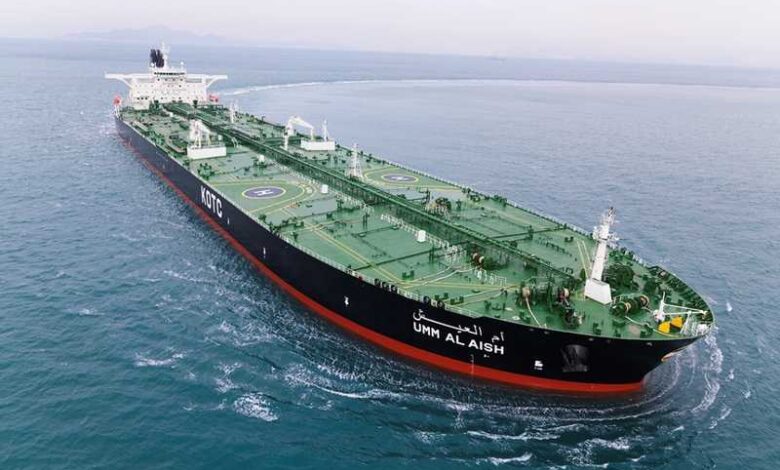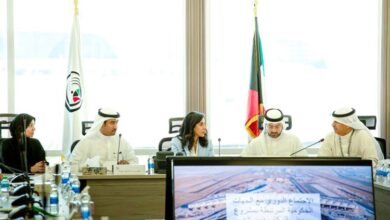Kuwait’s fuel exports to Europe surge fivefold in recent months
Kuwait Petroleum Corporation successfully sold fuel oil from the Al-Zour Refinery in European markets despite changes in the Ministry of Electricity and Water’s preference for natural gas over high-quality fuel oil with low sulfur content.

-
The Kuwait Petroleum Corporation tackled marketing hurdles and became a major player in the global bunker fuel supply chain, notably increasing low-sulfur bunker fuel production from eleven million tons annually to approximately thirteen million tons annually after operating the Al-Zour refinery.
-
In the face of a decline in global investments in refining due to clean energy transition plans, Kuwait has spent tens of billions of dollars on developing and building new refineries in recent years.
-
Due to sanctions on Russian oil derivatives, Europeans faced severe shortages of diesel and jet fuel. The corporation responded by ramping up exports from the Al-Zour refinery, notably boosting shipments of diesel and aviation fuel.
Kuwait Petroleum Corporation (KPC) capitalized on economic opportunities in Europe after the Russian-Ukrainian war. It successfully sold fuel oil from the Al-Zour Refinery in European markets despite changes in the Ministry of Electricity and Water’s preference for natural gas over high-quality fuel oil with low sulfur content.
Informed sources told Al-Qabas that the decision to build the Al-Zour refinery over twenty years ago aimed to meet the Ministry of Electricity’s needs, which later shifted to gas. This posed a challenge for KPC in managing the 250,000 barrels per day of fuel oil production from the refinery, emphasizing the importance of selling this product at top market value to maintain the refinery’s economic viability.
KPC’s successful strategies
The sources continued, In light of the Ministry of Electricity’s desire to use natural gas in its stations, the changing consumption pattern in generating electricity, and its preference for gas over fuel oil, the KPC overcame marketing challenges. It began finding solutions to utilize the fuel oil originally produced for the Ministry of Electricity, developing successful strategies for radical changes in the refinery’s operations.
These changes include adding units free of fuel oil, producing petroleum derivatives for external export, building petrochemical units to utilize fuel oil, and transferring a significant portion of the refinery’s production to global markets. This move allows the corporation to contribute to alleviating the acute shortage in European markets and aligning with future global demand growth.
Compensating Russian supply deficit
The sources revealed that Kuwait increased its exports of fuel oil, diesel, and jet fuel to Europe by five times in the past months. This increase aims to aid European engines and somewhat compensate for the Russian supply deficit, which the European Union faces following its decision to ban the import of refined petroleum materials from Russia. Europeans have experienced a major shortage of diesel and jet fuel due to sanctions imposed on Russian oil derivatives.
The sources added that the corporation worked during the past months to export many shipments from the Al-Zour refinery and was able to increase its exports of diesel and aviation fuel.
Al-Zour Refinery is one of the largest oil refineries in the Arabian Gulf region
Walid Al-Mukhaizeem, the Deputy Managing Director of Sales for Global Marketing at Kuwait Petroleum Corporation, told Al-Qabas that the Al-Zour Refinery is one of the largest oil refineries in the Arabian Gulf region and represents a major strategic project for Kuwait. He noted that the refinery is considered an advanced environmental project due to its capacity to produce high-quality environmental fuels, create job opportunities, and contribute to supporting the national economy.
He stated that one of the positive effects of the Al-Zour Refinery on Kuwaiti crude oil is its high ability to refine all types of Kuwaiti crude oil. This creates added value for Kuwaiti crude oil economics, maximizes private economic returns in refining operations, and shifts exports towards more oil derivatives instead of crude oil. This is especially crucial given the current geopolitical conditions that support the demand for refined petroleum products, particularly in European markets.
Global efforts to cut environmental impact of fossil fuels
Al-Mukhaizeem continued, “The full operation of the Al-Zour refinery will focus on producing 0.5% low-sulfur fuel oil. This helps Kuwait adhere to the highest environmental standards by providing fuel that significantly reduces sulfur emissions, aligning with global efforts to reduce the environmental impact of fossil fuels.”
He also mentioned that the production from Al-Zour Refinery supports local energy needs. A large portion of environmentally friendly fuel will be used to generate local energy, enhancing energy security and reducing Kuwait’s carbon footprint related to energy consumption.
Al-Mukhaizeem pointed out that the production from the Al-Zour refinery enabled the Kuwaiti oil sector to establish a strategic presence in global markets.
This helped Kuwait Petroleum Corporation ship large quantities of diesel, making Kuwait the fifth-highest supplier to the European continent after increasing production volume from twelve million tons annually to nineteen million tons annually.
He added, “The KPC also became the primary supplier of aviation fuel to European markets after increasing production volume from ten million tons annually to fourteen million tons annually.”
He mentioned that Kuwait Petroleum Corporation expanded its market share in North and South America due to product quality. He explained that the corporation targeted strategic ship fuel markets like Singapore and Fujairah by employing advanced marketing methods, which increased economic returns.
The corporation became a major player in the global bunker fuel supply chain, notably increasing low-sulfur bunker fuel production from eleven million tons annually to approximately thirteen million tons annually after operating the Al-Zour refinery. This increase enables the corporation to meet the rising demand for low-sulfur fuel options in maritime transportation.
Kuwait spent billions of dollars to develop new refineries
In the face of a decline in global investments in refining due to clean energy transition plans, Kuwait has spent tens of billions of dollars on developing and building new refineries in recent years.
The region has emerged as an alternative for Russian energy imports. As Europe began reducing its dependence on Russian energy imports post-war, the Middle East, especially the Gulf region, became a major alternative destination for many countries. According to estimates from Fortescue, European diesel and gasoline imports from the Middle East surged by over 30% in the last quarter of the previous year, while imports from Russia dropped to less than 40%, down from the previous 52%.
Al-Zour Refinery one of world’s largest oil refineries
The Al-Zour Refinery is Kuwait’s most significant investment and one of the largest oil refineries globally. Designed to process 615,000 barrels of crude oil per day, it shipped its first exports of diesel and jet fuel late last year. Once fully operational, it is expected that Kuwait’s total refining capacity will rise to about 1.5 million barrels per day.













